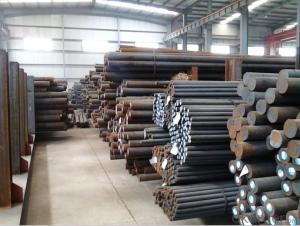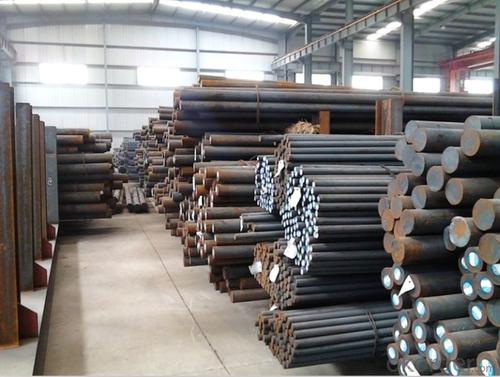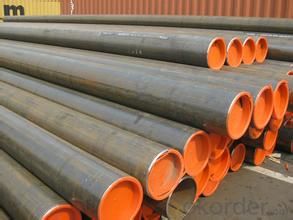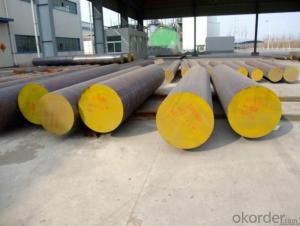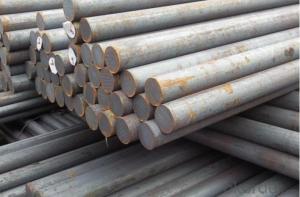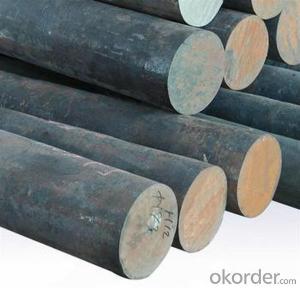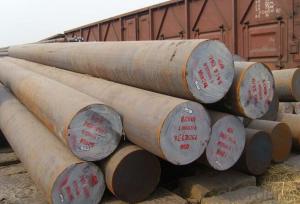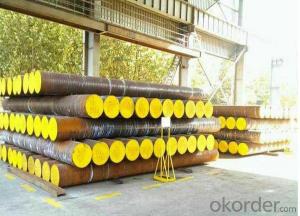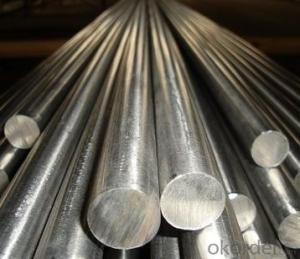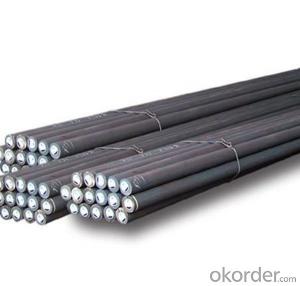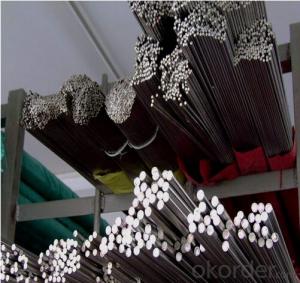Alloy Steel 4Cr13 Special Steel Carbon Steel
- Loading Port:
- China main port
- Payment Terms:
- TT OR LC
- Min Order Qty:
- 25 m.t.
- Supply Capability:
- 10000 m.t./month
OKorder Service Pledge
OKorder Financial Service
You Might Also Like
Specification
Chemical Composition(GB)%
C | Si | Mn | Cr | P | S |
0.4 | 0.5 | 0.7 | 13 | ≤0.030 | ≤0.030 |
Standard
GB | ASTM | DIN | JIS |
4Cr13 | 4.2 | 1.2083 | 420J2 |
Available Size
Rolled plate | 12-120mm*720mm*6000mm | ||
Module | 130-400mm*1000mm*6000mm | ||
Heat Treatment
Processing | Temperature ℃ | Hardness |
Anneal | 750-800 | ≤235HB |
Quenching | 1050-1100 | ≥50HRC |
Tempering | 200-300 | ≥50HRC |
Characterstics
1.High corrosion resistance and mirror performance
2.Higher strength and abrasion resistance
Applications:Suitable for precise dies with super mirror performance and abrasion resistance,camera components,optical lens


1, Your advantages?
professional products inquiry, products knowledge train (for agents), smooth goods delivery, excellent customer solution proposale
2, Test & Certificate?
SGS test is available, customer inspection before shipping is welcome, third party inspection is no problem
3, Payment Terms?
30% TT as deposit and 70% before delivery.
Irrevocable L/C at sight.
4, Trading Terms?
EXW, FOB, CIF, FFR, CNF
6, After-sale Service?
We provides the services and support you need for every step of our cooperation. We're the business partner you can trust.
For any problem, please kindly contact us at any your convenient time.
We'll reply you in our first priority within 24 hours.
- Q: How does special steel perform in high-pressure environments?
- Special steel performs exceptionally well in high-pressure environments due to its superior strength, durability, and resistance to corrosion. Its unique composition and advanced manufacturing processes enable it to withstand extreme pressures, preventing deformation and maintaining structural integrity. Additionally, special steel's high tensile strength allows it to handle the immense stress and pressure without compromising its performance or safety.
- Q: What are the different surface modification techniques used for special steel?
- Some of the different surface modification techniques used for special steel include heat treatment, electroplating, coatings, and nitriding. These techniques are utilized to enhance the steel's hardness, corrosion resistance, wear resistance, and overall performance in various applications.
- Q: What are the disadvantages of using special steel?
- One of the main disadvantages of using special steel is its high cost. Special steel is typically more expensive to produce and purchase compared to regular steel. Additionally, the production process for special steel often requires specific techniques and equipment, which can further increase costs. Another disadvantage is the limited availability of special steel. It may not be readily accessible in all regions, leading to longer lead times and potential supply chain issues. Moreover, special steel may have lower formability and machinability compared to regular steel, making it more challenging to work with and shape as needed.
- Q: How does special steel contribute to the waste management industry?
- Special steel contributes to the waste management industry by providing durable and corrosion-resistant materials for the construction of waste handling equipment and infrastructure. Special steel is used to manufacture waste containers, compactors, shredders, and incinerators, ensuring their longevity and efficiency in handling waste. Additionally, special steel is utilized in the construction of waste treatment plants and landfill facilities, providing structural strength and resistance to harsh environmental conditions. Overall, special steel plays a crucial role in enhancing the effectiveness and sustainability of waste management practices.
- Q: How does special steel contribute to the aerospace safety?
- Special steel contributes to aerospace safety in several ways. Firstly, special steel alloys such as titanium and stainless steel are used in the construction of critical components like landing gear, engine parts, and structural elements. These alloys offer high strength-to-weight ratios, corrosion resistance, and excellent heat resistance, ensuring the durability and reliability of aerospace structures. Moreover, special steel plays a crucial role in manufacturing precision instruments and tools used in aerospace maintenance and repair. These tools are essential for maintaining the safety and functionality of aircraft, ensuring accurate measurements, and facilitating effective repairs. Furthermore, special steel is utilized in the production of safety-critical fasteners, such as bolts and screws, which hold various aircraft components together. These fasteners need to withstand extreme forces and vibrations during flight, and special steel materials provide the necessary strength and durability to ensure their reliability. Overall, the use of special steel in aerospace applications enhances the safety of aircraft by providing robust and reliable materials for construction, maintenance, and repair, ultimately contributing to the overall integrity and performance of aerospace systems.
- Q: What are the main advantages of using special steel in the food processing industry?
- The main advantages of using special steel in the food processing industry are its high corrosion resistance, durability, and hygienic properties. Special steel is resistant to rust and corrosion, ensuring that it does not contaminate the food being processed. It also possesses excellent strength and durability, making it suitable for handling heavy loads and withstanding harsh operating conditions. Furthermore, special steel is easy to clean and maintain, promoting a higher level of hygiene in food processing facilities.
- Q: How is special steel used in the textile supply chain?
- Special steel is used in the textile supply chain for various applications such as manufacturing textile machinery, equipment, and tools. The high strength and durability of special steel make it ideal for creating components that can withstand the demanding conditions of textile production, including high temperatures, corrosion, and heavy loads. It is commonly used in the production of spinning machines, looms, needles, and other crucial parts, ensuring efficient and reliable textile manufacturing processes.
- Q: What are the specific requirements for special steel used in the oil and gas pipeline industry?
- The specific requirements for special steel used in the oil and gas pipeline industry are dictated by the harsh operating conditions and the need for high performance and reliability. Some of the key requirements include: 1. Corrosion resistance: Special steel used in the oil and gas pipeline industry must possess excellent resistance to corrosion, as pipelines are exposed to various corrosive elements such as moisture, gases, and chemicals. This helps to prevent the degradation or failure of the pipeline due to corrosion. 2. High strength: The steel used in pipelines must have high tensile strength to withstand the high pressure and stress that it experiences during transportation of oil and gas. This ensures the pipeline's structural integrity and prevents leaks or bursts. 3. Toughness and impact resistance: The steel must be able to absorb energy and resist fracture when subjected to sudden impact or external forces. This is crucial for maintaining pipeline integrity and preventing accidents or ruptures. 4. Low temperature toughness: As pipelines often operate in cold environments, the steel must exhibit excellent low-temperature toughness to prevent brittle fracture. This ensures that the pipeline remains ductile and resistant to failure even at extremely low temperatures. 5. Weldability: Special steel used in pipelines should be easily weldable to facilitate the construction and repair of pipelines. Good weldability ensures strong and reliable joints that can withstand the stress and pressure during operation. 6. Resistance to hydrogen-induced cracking: Steel used in the oil and gas pipeline industry should have high resistance to hydrogen-induced cracking (HIC) and sulfide stress cracking (SSC). These types of cracks can occur when hydrogen or sulfide ions penetrate the steel, leading to catastrophic failure. Resistance to these types of cracking is crucial for pipeline safety. 7. Compliance with industry standards: Special steel used in the oil and gas pipeline industry must meet specific industry standards and regulations. These standards ensure that the steel meets the required mechanical properties, chemical composition, and manufacturing processes necessary for safe and reliable pipeline operation. Overall, the specific requirements for special steel used in the oil and gas pipeline industry are aimed at ensuring corrosion resistance, high strength, toughness, low-temperature performance, weldability, resistance to cracking, and compliance with industry standards. These requirements are essential for maintaining the integrity and safety of oil and gas pipelines.
- Q: What are the requirements for special steel used in transportation infrastructure?
- Special steel used in transportation infrastructure must meet certain requirements to ensure its durability, strength, and resistance to various environmental factors. Some of the key requirements for special steel in transportation infrastructure include: 1. High Strength: Special steel used in transportation infrastructure must have high tensile strength to withstand heavy loads and stresses. It should be able to resist deformation and maintain its structural integrity under significant pressure. 2. Corrosion Resistance: Transportation infrastructure is often exposed to harsh weather conditions, including rain, humidity, and saltwater. Special steel must have excellent corrosion resistance to prevent rusting and deterioration over time. This is particularly important for bridges, tunnels, and railway tracks located near coastal areas. 3. Fatigue Resistance: Transportation infrastructure experiences repetitive and cyclic loading, which can lead to fatigue failure if the steel used is not resistant to this type of stress. Special steel should have good fatigue resistance properties to prevent cracking and failure due to repeated loading. 4. Weldability: Special steel used in transportation infrastructure should have good weldability to facilitate construction and repairs. It should be easily weldable without compromising its strength and performance. 5. Impact Resistance: Transportation infrastructure, such as guardrails and crash barriers, is subjected to impact loads from vehicles. Special steel should possess excellent impact resistance to absorb and distribute the energy from impacts, reducing the risk of catastrophic failure. 6. Fire Resistance: In the event of a fire, special steel used in transportation infrastructure should have a high melting point and retain its structural integrity for a reasonable amount of time. This is crucial for ensuring the safety of passengers and minimizing the damage caused by fire incidents. 7. Low Maintenance: For cost-effectiveness and long-term sustainability, special steel used in transportation infrastructure should require minimal maintenance. It should have a long service life and minimal need for repainting, repair, or replacement. Meeting these requirements ensures that the special steel used in transportation infrastructure can provide a safe, reliable, and durable foundation for roads, bridges, railway tracks, and other critical components of the transportation network.
- Q: What are the properties of special steel?
- Special steel has several unique properties that make it highly desirable in various industries. Firstly, it possesses exceptional strength and durability, allowing it to withstand high levels of stress, pressure, and temperature. This property makes it suitable for applications in construction, automotive, and aerospace sectors where strength and reliability are crucial. Additionally, special steel offers excellent corrosion resistance, ensuring its longevity even in harsh environments. It is also known for its excellent machinability, weldability, and formability, making it easy to work with and shape into desired forms. Furthermore, special steel exhibits good magnetic properties, making it ideal for use in electrical components and magnetic devices. Overall, the properties of special steel make it a versatile material that can be customized for specific applications, offering exceptional performance and reliability.
Send your message to us
Alloy Steel 4Cr13 Special Steel Carbon Steel
- Loading Port:
- China main port
- Payment Terms:
- TT OR LC
- Min Order Qty:
- 25 m.t.
- Supply Capability:
- 10000 m.t./month
OKorder Service Pledge
OKorder Financial Service
Similar products
Hot products
Hot Searches
Related keywords
